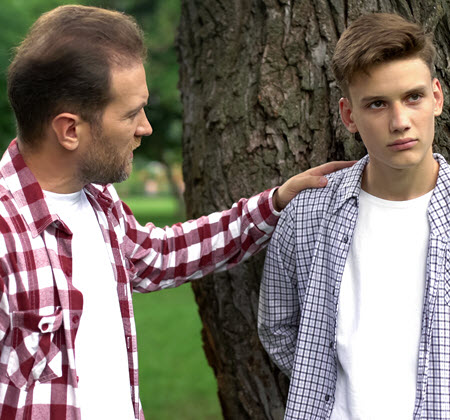 You’re busy, tired… and no one trained you for this.
You’re busy, tired… and no one trained you for this.
Your child has had an unsettling experience or meltdown. It has become clear that they need more support.
And you do so much as a parent… so you can’t help but want to take this on, too.
You offer some advice on how to handle the situation when suddenly your child explodes. They shout how you “just don’t understand.”
As they storm off, you’re left feeling baffled. What on earth just happened?? Why do your attempts at loving them result in their pushing you away like that?
“Why can’t my love be enough for them to be okay?”
Mental health in kids and teens is confusing. And even though you know and love them more than anyone, navigating a mental health challenge alone is too much for most parents.
Plus, as a parent, you’re at odds with your child when it comes to their mental health.
When your child is over-the-top mad at you for everyday things, you can’t be the one to process it with them. They need space to vent their thoughts and feelings and a third party to listen to them. That’s where I come in.
One of the hardest parts of parenting…
… is when you know how to help them, but they just won’t listen.
I have years of experience connecting with kids in a way where they listen. They learn the life lessons you were trying to teach all along. As they understand, they grow and improve.
Once they have run out of steam and shared it all, they know I am listening and that I understand. I’ll offer them new perspectives, and a lot of it will sound like things you’ve said to them yourself! But this time, they hear it, a light bulb goes off, and they agree it’s a good idea.
 Knowing how to help and reconnecting them to your family is my specialty.
Knowing how to help and reconnecting them to your family is my specialty.
Letting your child have a judgment-free space to blow off steam means less of their blowing up on you.
When I work with young people, I talk with parents regularly. But I spend most of my time laying the groundwork with the child or teen.
Here’s an example of how I can help…
Riley* was so angry. He would blow up and scream at his parents. They tried to talk him down, but this just made his anger last longer. Riley asked to talk to someone about his anger.
When our sessions first started, we played card games and handball. As we played, he began to talk about his anger. I listened and reflected on what was going on. This helped him to know that I understood.
Then we started the process of figuring out what to do about it. I taught Riley about his brain development and what was happening for him when he got angry. We read books, looked at charts, and even watched a few educational video clips. Then, we started to problem-solve. He wanted to control his anger instead of letting his anger control him, so he came up with a plan to master it.
With his plan in place, we had a family meeting. I coached his parents on what to expect and how to respond. Riley presented his plan to his parents. They agreed to his plan and encouraged him. Afterward, they told me that his plan was everything they had been suggesting to him for months; Riley just hadn’t been able to hear it from them. Riley practiced his plan and fine-tuned it over the next few sessions. After a month of no explosive anger, Riley graduated from therapy.
 Your child CAN master their emotions.
Your child CAN master their emotions.
I know that right now, there’s a lot of tension in your family… and home might feel like a battlefield.
I’m sure that all you want to do is get back to the way things were before – when there were no explosions… when you used to laugh together.
If you are ready to reconnect to your child and restore peace within your home, then I’m ready to get started with you.
Give me a call today, and let’s have a free 15-minute consultation to talk about how we can get your child back on track: (507) 216-0106.
*Name changed to preserve client confidentiality.

